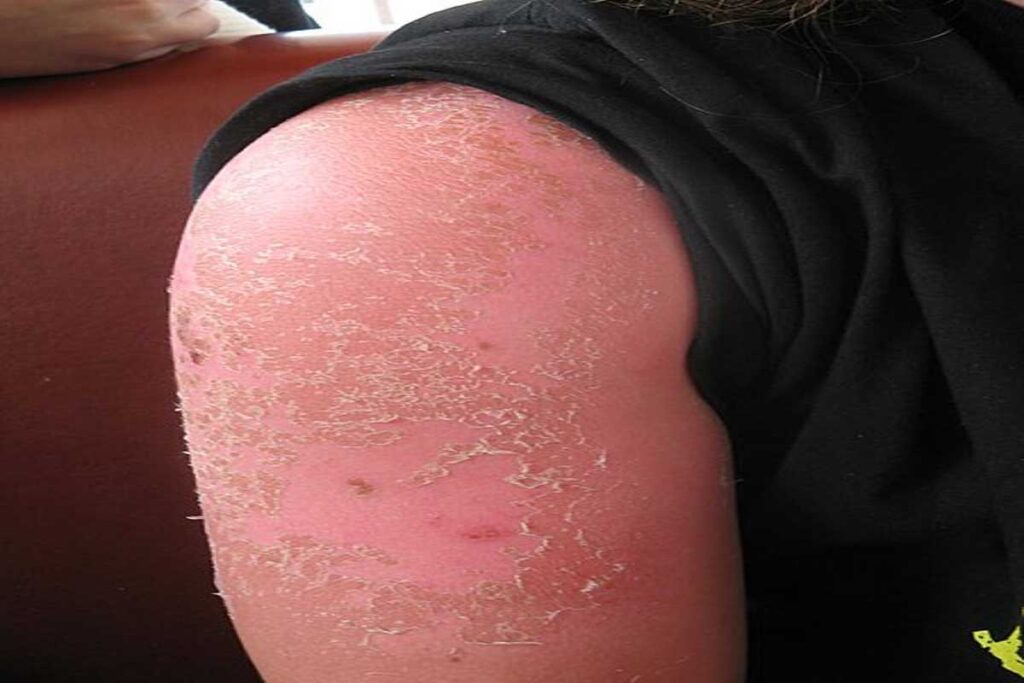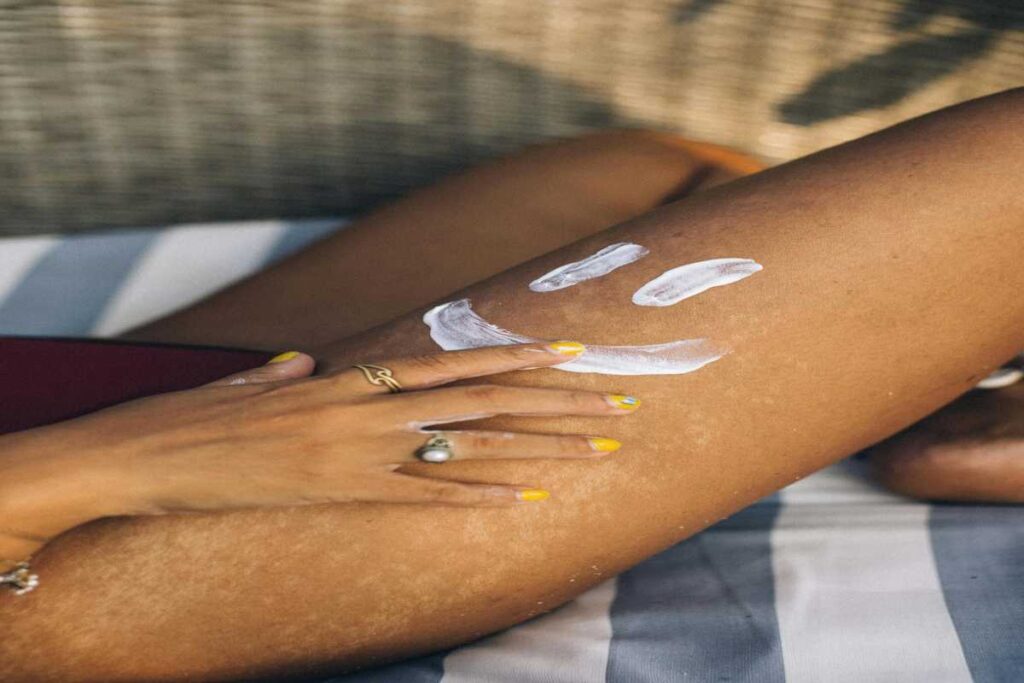Spending time outdoors, especially during sunny days, can be enjoyable and beneficial. However, prolonged exposure to the sun can lead to skin damage, ranging from mild sunburn to severe sun poisoning. Understanding the differences between these two conditions, along with their symptoms, remedies, and prevention methods, is essential for protecting your skin and overall health.

What Is Sunburn?
Sunburn is a common skin condition caused by overexposure to ultraviolet (UV) radiation from the sun. It primarily affects the outer layer of the skin, known as the epidermis. Sunburn is characterized by redness, pain, and inflammation. The severity of sunburn can vary based on skin type, duration of sun exposure, and UV intensity.
Symptoms of Sunburn
Sunburn typically presents with the following symptoms:
- Red, painful skin: Affected areas may be warm to the touch, and the redness can develop within a few hours after sun exposure.
- Swelling: The skin can become swollen and sensitive, leading to discomfort.
- Blisters: In more severe cases, blisters may form, indicating damage to deeper skin layers.
- Peeling: As the skin begins to heal, it may start to peel or flake, a sign of the body shedding damaged skin cells.
- Fever and chills: In some instances, mild systemic symptoms like fever and chills can occur, indicating the body’s response to sun damage.
What Is Sun Poisoning?
Sun poisoning is a more severe form of sunburn that results from prolonged and intense exposure to UV radiation. It affects not only the outer layer of the skin but can also lead to systemic reactions in the body. Sun poisoning requires immediate attention as it can lead to more serious health issues.
Symptoms of Sun Poisoning
The symptoms of sun poisoning can be more severe and include:
- Severe redness and pain: The skin may appear extremely red and feel intensely painful, often worse than typical sunburn.
- Blisters: Large blisters may form on the skin, indicating significant damage.
- Swelling: The affected areas can become very swollen, causing discomfort and pain.
- Fever and chills: These systemic symptoms are common with sun poisoning, reflecting the body’s inflammatory response.
- Nausea and vomiting: Some individuals may experience gastrointestinal symptoms, which can be distressing.
- Headaches: Severe headaches can accompany sun poisoning, further adding to the discomfort.
Key Differences Between Sunburn and Sun Poisoning

Sunburn and sun poisoning differ in severity and symptoms. Sunburn is generally milder and primarily affects the skin, while sun poisoning can cause more severe reactions and systemic symptoms.
| Feature | Sunburn | Sun Poisoning |
|---|---|---|
| Severity | Mild to moderate | Severe |
| Skin Damage | Affects the outer skin layer | Affects deeper skin layers |
| Systemic Symptoms | Rare | Common (fever, chills, nausea) |
| Blisters | May occur, but smaller | Larger, more severe blisters |
| Healing Time | A few days to a week | Longer, can take weeks |
Remedies for Sunburn and Sun Poisoning
Remedies for Sunburn
When treating sunburn, it’s important to alleviate symptoms and promote healing. Here are some effective remedies:
- Cool Compress: Apply a cool, damp cloth to the affected areas to reduce pain and inflammation. This can provide immediate relief and help soothe the skin.
- Aloe Vera Gel: Use aloe vera, which is well-known for its soothing properties, to calm the skin and promote healing. Look for products with a high percentage of aloe to maximize benefits.
- Hydration: Drink plenty of fluids to stay hydrated. Sunburn can lead to dehydration, so it’s crucial to replenish lost fluids.
- Over-the-Counter Pain Relievers: Use medications like ibuprofen or acetaminophen to relieve pain and reduce inflammation. Follow the recommended dosage on the packaging.
- Moisturizers: Apply gentle moisturizers to keep the skin hydrated and prevent peeling. Look for products that are fragrance-free and suitable for sensitive skin.
Remedies for Sun Poisoning
Sun poisoning requires more intensive care. Here are some remedies and actions to take:
- Seek Medical Attention: If you experience symptoms of sun poisoning, especially fever, chills, or severe pain, it’s important to consult a healthcare professional. They can provide appropriate treatments and medications.
- Cool Baths: Taking cool baths or showers can soothe the skin and alleviate discomfort. Avoid hot water, as it can worsen irritation and pain.
- Topical Steroids: In some cases, a doctor may prescribe topical steroids to reduce inflammation and relieve itching.
- Stay Hydrated: Continue to drink fluids regularly to prevent dehydration. Electrolyte-rich drinks can be beneficial if you’ve lost fluids due to sweating or nausea.
- Rest: Give your body time to heal by getting plenty of rest. This allows your immune system to recover and manage the symptoms more effectively.

Prevention of Sunburn and Sun Poisoning
Preventing sunburn and sun poisoning is crucial for maintaining skin health. Here are effective strategies for sun safety:
General Sun Safety Tips
- Use Sunscreen: Apply broad-spectrum sunscreen with an SPF of at least 30. Be sure to reapply every two hours, and after swimming or sweating, to maintain protection.
- Wear Protective Clothing: Opt for long sleeves, wide-brimmed hats, and UV-protective sunglasses. Wearing protective clothing helps shield your skin from harmful UV rays.
- Seek Shade: Whenever possible, stay in the shade, especially during peak sunlight hours (10 a.m. to 4 p.m.) when UV radiation is strongest.
- Limit Sun Exposure: Gradually increase your time in the sun to allow your skin to adapt and build tolerance. Avoid staying out for prolonged periods without protection.
- Avoid Tanning Beds: Tanning beds can increase your risk of skin damage and skin cancer. Opt for safer alternatives, like self-tanning products, if you want a tan.
Special Considerations
- Children and Fair Skin: Individuals with fair skin, a history of sunburn, or certain skin conditions should be particularly cautious. Children are more sensitive to UV radiation and require extra protection.
- Medication Interactions: Some medications can increase sensitivity to sunlight, leading to a higher risk of sunburn. Consult your doctor if you are taking medication that may have this side effect.
Conclusion
Understanding the differences between sunburn and sun poisoning, along with their symptoms, remedies, and prevention strategies, is crucial for protecting your skin during outdoor activities. By taking proactive measures to prevent sun damage and knowing how to respond to sunburn or sun poisoning, you can enjoy the sun safely while maintaining healthy skin. Always remember that a little caution goes a long way in safeguarding your skin against harmful UV rays. Taking care of your skin is essential for long-term health and well-being.
